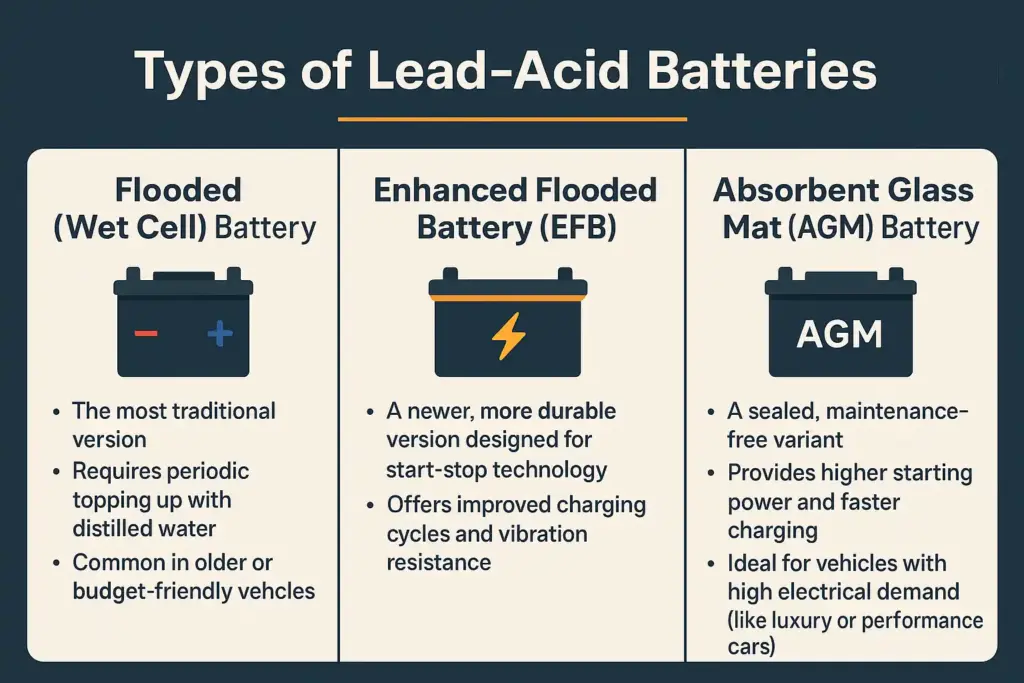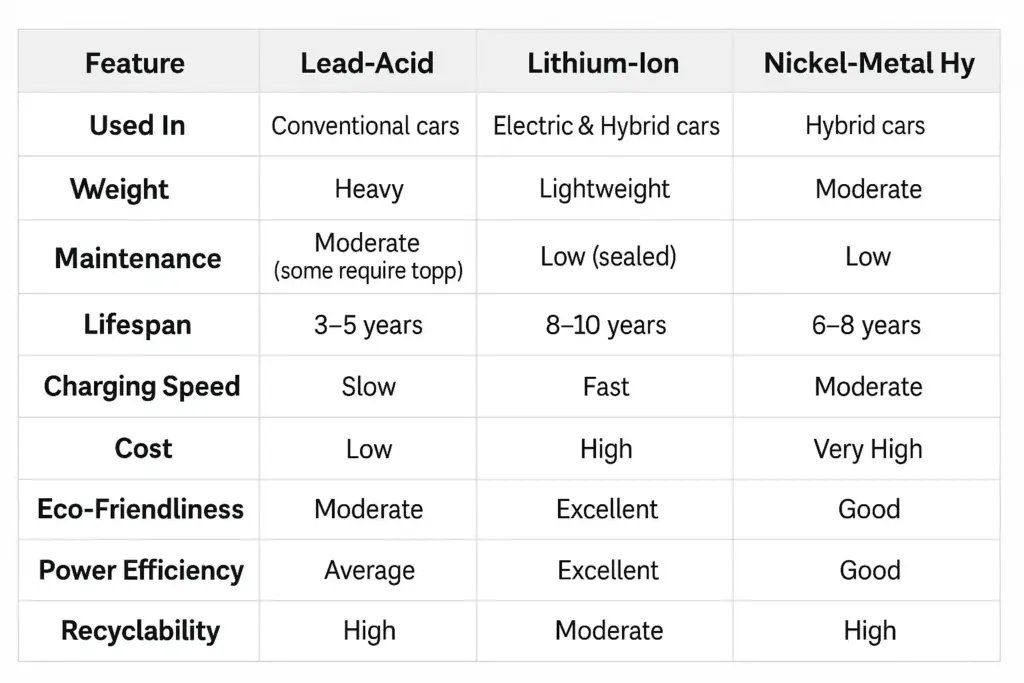What Are the 3 Different Types of Car Batteries? —Which One Is Best for Your Vehicle?
Your car battery does more than start the engine. It also runs the lights and other parts in your car. But not all car batteries work the same.
Here are the three types of car batteries:
Lead-acid batteries work well in most petrol and diesel cars.
Lithium-ion batteries work in electric and hybrid cars.
NiMH batteries work in many hybrid cars.
Below, we explain how each battery works and how to choose the right one for your car.
1. Lead-Acid Batteries (Traditional, Reliable & Budget-Friendly)
What Is a Lead-Acid Battery?
Lead-acid batteries are common in many petrol and diesel cars. They use simple parts to make strong power and start the engine. These batteries stay popular because they cost less and are easy to find.
Here are the three main types:
Flooded batteries cost the least. They need water added now and then. You see them in older or basic cars.
EFB batteries work well in cars with stop-start systems. They last longer and handle bumps better.
AGM batteries need no upkeep. They charge fast and give strong power. They are used in cars with many lights, screens, or extra features.
Pros and Cons of Lead-Acid Batteries
Pros:
They cost less.
They are easy to buy and replace.
They work well for daily driving.
They handle most weather.
Cons:
They last only 3 to 5 years.
They are heavy.
Some need upkeep.
Best for:
Most petrol and diesel cars.
Drivers who want a low-cost, reliable battery.
Cars with simple electrical systems.
2. Lithium-Ion Batteries (Lightweight, Efficient & Long-Lasting)
Lithium-ion batteries hold power with tiny ions that move inside the battery. This helps the battery charge fast and work well. These batteries are light, strong, and common in electric and hybrid cars. Many last eight to ten years or more.
Here are the key benefits:
They hold a lot of power in a small size.
They are light and help the car use less energy.
They last longer than lead-acid batteries.
They charge fast.
They need little to no upkeep.
Here are the drawbacks:
They cost more.
They can get hot if not cared for.
They need special recycling.
Best for:
Electric cars.
Hybrid cars.
Drivers who want long-lasting, high performance.
3. Nickel-Metal Hydride (NiMH) Batteries (Eco-Friendly & Durable)
What Is an NiMH Battery?
NiMH batteries store energy with simple metal parts. Many hybrid cars use them, like the Toyota Prius and Honda Insight. These batteries are popular because they last long, stay safe, and are better for the environment.
Why NiMH Batteries Are Popular in Hybrids
- They can charge and release power many times.
They work in hot or cold weather.
They are safer and more stable than lithium-ion batteries.
They use materials that can be recycled
Pros and Cons of NiMH Batteries
Pros:
They last six to eight years.
They are easy to recycle and better for the environment.
They work well in hybrid systems.
They handle stop-and-go driving.
Cons:
They are heavier than lithium-ion batteries.
They lose charge faster when not in use.
They can get a “memory effect” if charged the wrong way
Best For:
Hybrid cars.
Drivers who care about the environment.
City driving with lots of stops
Comparison Table: Lead-Acid vs. Lithium-Ion vs. NiMH
| Feature | Lead-Acid | Lithium-Ion | Nickel-Metal Hydride |
|---|---|---|---|
| Used In | Petrol/Diesel Cars | EVs & Hybrids | Hybrids |
| Weight | Heavy | Lightweight | Moderate |
| Maintenance | Medium | Low | Low |
| Lifespan | 3–5 years | 8–10 years | 6–8 years |
| Charging Speed | Slow | Fast | Moderate |
| Cost | Low | High | Medium |
| Eco-Friendliness | Moderate | High | Very High |
| Efficiency | Average | Excellent | Good |
| Recyclability | High | Moderate | High |
4. How to Choose the Right Car Battery
The right battery depends on your vehicle, driving habits, and climate. Use this quick checklist to guide your decision:
Vehicle Type
-
Petrol/Diesel: Lead-Acid or AGM
-
Hybrid: NiMH or Lithium-Ion
-
Electric: Lithium-Ion only
Battery Size & Fit
Match your vehicle’s battery tray to avoid loose terminals or incorrect placement.
Cold Cranking Amps (CCA)
Higher CCA = better winter starting performance.
Reserve Capacity (RC)
Indicates how long your battery can run electrical systems if the alternator fails.
Brand & Warranty
Choose reputable brands with a 2–4 year warranty for added peace of mind.
FAQs on What Are the 3 Different Types of Car Batteries?
What are the three main types of car batteries?
Lead-acid, lithium-ion, and nickel-metal hydride (NiMH).
Which car battery lasts the longest?
Lithium-ion (8–10 years), followed by NiMH (6–8 years), then lead-acid (3–5 years).
Can I replace a lead-acid battery with lithium-ion?
Not directly—lithium-ion requires compatible charging systems and safety controls.
Which battery performs best in cold weather?
AGM lead-acid batteries offer superior cold-cranking performance.
What’s the most eco-friendly battery?
NiMH, thanks to its recyclability and low toxicity.
Final Thoughts—Which Car Battery Should You Choose?
Each battery type has its own use:
Lead-acid batteries cost less and work well in most cars.
Lithium-ion batteries last long and give strong power. They are best for electric and hybrid cars.
NiMH batteries are safe, green, and great for hybrid cars.
Choose the battery that fits your car and needs. A good battery helps your car run well. With simple care and on-time replacement, your battery can last longer.
Need Help Choosing or Replacing Your Battery?
At Car Fix Advisor, we help drivers pick the right battery based on their vehicle, driving habits, and budget.
If you want expert guidance—or need help installing your next battery—we’re here to make the process simple and stress-free.
👉 Tell me the make, model, and year of your car through the comments, and I will recommend the best battery option.


